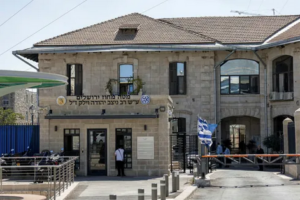‘Intolerable overcrowding’: Prisoners held in packed cells in Israeli facilities amid Hamas war

Jerusalem’s Russian Compound
Chen Maanit reports in Haaretz on 7 February 2024:
The arrest of thousands of terrorists and terror suspects since Israel’s war with Hamas began on October 7 has led to a severe deterioration in prison conditions, a report by the Public Defender’s Office found.
The report, released on Tuesday, was based on visits by public defenders to four facilities in December – Carmel Prison, Damon Prison, Eshel Prison and the police lockup in Jerusalem’s Russian Compound. It noted that the deteriorating conditions affect all prisoners and detainees, even those not convicted or suspected of terror-related offenses.
Almost half of all prisoners and detainees are being held in packed conditions, with less than 3 square meters of space per person, the report said. Around 3,400 have no beds and must sleep on mattresses on the floor.
In October, due to the war and the surge of arrests that followed, the Knesset’s National Security Committee passed emergency legislation authorizing a temporary deviation from the minimal prison conditions set by the Supreme Court. This temporary order is slated to be in effect for seven months.
The result, the report said, has been wretched conditions: “Intolerable overcrowding; poor sanitary conditions; hygiene problems and infestations; poor ventilation; a lack of basic equipment for the prisoners.”
During a tour of Carmel Prison’s Cellblock 1, the report continued, conditions were so crowded that 13 prisoners had to share a single toilet. “This naturally creates great pressure in the prison,” it said. “It creates friction among the prisoners and even leads to situations in which older prisoners have trouble holding it in and waiting their turn for the bathroom. Prisoners in the cellblock also complained about how cold their cells were at night.”
In 2017, the Supreme Court ruled that each prisoner must have 4.5 square meters of living space (including the toilet and shower). It also laid down a schedule for reaching this standard, saying that living space must be expanded to 3 square meters per prisoner within nine months of the ruling and to 4.5 square meters within 18 months.
Nevertheless, it was only two years later that the state said it had met the interim goal of 3 square meters per prisoner. And it filed repeated requests for postponements of the final target, saying the government needed more time to approve and implement prison expansion plans. The current target date for meeting the standard of 4.5 square meters is the end of 2027.
After October 7, Israel arrested thousands of terrorists, suspected terrorists and people suspected of incitement, causing a dramatic increase in overcrowding at already packed prisons. According to National Security Ministry data, 3,400 people were jailed between October 7 and the start of this week, bringing the total number of prisoners to 20,113.
During a visit to Damon Prison, public defenders found that on top of the building’s bad physical condition, many prisoners had to sleep on mattresses on the floors.
In Eshel Prison, they found that squat toilets had been installed with showers placed on top of them. Moreover, prisoners had to store their cooking and eating utensils in the same space. In one cell, the window wouldn’t close properly, so the prisoners had to cover it with plastic sheeting to keep the cold air from coming in. In addition, rats were entering the cells through sewage pipes.
One security prisoner held in Eshel’s isolation block told the public defenders that since the war began, all his personal belongings except his clothes have been confiscated, including pictures of his family, cooking utensils and food that he bought from the canteen. And although prisoners receive vegetables (such as potatoes or eggplant) six times a week, they can’t cook them because their cooking utensils were confiscated, he said.
At the Russian Compound, which normally holds a maximum of 170 detainees, there were 230 during the public defenders’ visit. Moreover, due to Prison Service regulations for terror suspects, the beds had no mattresses, and every day between 5 A.M. and 9 P.M., the electricity in the cells was shut off and all the blankets were removed from them. The detainees said the power remained off even during mealtimes, so they were forced to eat in darkness.
In addition, ever since the war began, they have been forbidden to go outside to the exercise yard, the detainees said. As a result, some of them haven’t seen the light of day since they were arrested.
The report recommended that the state reduce the number of prisoners and detainees by encouraging alternatives to arrest, like electronic monitoring. It also recommended expanding the prisons to make room for 1,280 additional prisoners by the end of 2027; accelerating construction of the new Megiddo Prison, which is slated to have room for 2,600 more prisoners than the older prisons it will replace; and replacing the tents that currently house some prisoners with permanent buildings.
Finally, it called for setting up a steering committee to oversee implementation. This committee should assess the prison situation every six months, suggest solutions to problems and consider whether the new Megiddo Prison should be expanded even further, it said.
The Prison Service said that since the war began, it has been contending with a state of emergency due to the influx of thousands of new prisoners. It added that when the new acting prison commissioner, Kobi Yaakobi, took office last month, he ordered immediate steps to ease the situation, including moving forward with a plan to add more cells.
This article is reproduced in its entirety
